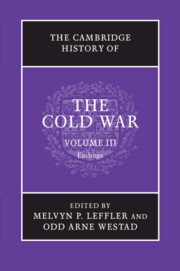Book contents
- Frontmatter
- 1 The Cold War and the intellectual history of the late twentieth century
- 2 The world economy and the Cold War, 1970–1990
- 3 The rise and fall of Eurocommunism
- 4 The Cold War and Jimmy Carter
- 5 Soviet foreign policy from détente to Gorbachev, 1975–1985
- 6 Islamism, the Iranian revolution, and the Soviet invasion of Afghanistan
- 7 The collapse of superpower détente, 1975–1980
- 8 Japan and the Cold War, 1960–1991
- 9 China and the Cold War after Mao
- 10 The Cold War in Central America, 1975–1991
- 11 The Cold War and southern Africa, 1976–1990
- 12 The Gorbachev revolution and the end of the Cold War
- 13 US foreign policy under Reagan and Bush
- 14 Western Europe and the end of the Cold War, 1979–1989
- 15 The East European revolutions of 1989
- 16 The unification of Germany, 1985–1991
- 17 The collapse of the Soviet Union, 1990–1991
- 18 Science, technology, and the Cold War
- 19 Transnational organizations and the Cold War
- 20 The biosphere and the Cold War
- 21 The Cold War and human rights
- 22 The Cold War in the longue durée: global migration, public health, and population control
- 23 Consumer capitalism and the end of the Cold War
- 24 An ‘incredibly swift transition’: reflections on the end of the Cold War
- 25 The restructuring of the international system after the Cold War
- Bibliographical essay
- Index
- References
24 - An ‘incredibly swift transition’: reflections on the end of the Cold War
Published online by Cambridge University Press: 28 September 2010
- Frontmatter
- 1 The Cold War and the intellectual history of the late twentieth century
- 2 The world economy and the Cold War, 1970–1990
- 3 The rise and fall of Eurocommunism
- 4 The Cold War and Jimmy Carter
- 5 Soviet foreign policy from détente to Gorbachev, 1975–1985
- 6 Islamism, the Iranian revolution, and the Soviet invasion of Afghanistan
- 7 The collapse of superpower détente, 1975–1980
- 8 Japan and the Cold War, 1960–1991
- 9 China and the Cold War after Mao
- 10 The Cold War in Central America, 1975–1991
- 11 The Cold War and southern Africa, 1976–1990
- 12 The Gorbachev revolution and the end of the Cold War
- 13 US foreign policy under Reagan and Bush
- 14 Western Europe and the end of the Cold War, 1979–1989
- 15 The East European revolutions of 1989
- 16 The unification of Germany, 1985–1991
- 17 The collapse of the Soviet Union, 1990–1991
- 18 Science, technology, and the Cold War
- 19 Transnational organizations and the Cold War
- 20 The biosphere and the Cold War
- 21 The Cold War and human rights
- 22 The Cold War in the longue durée: global migration, public health, and population control
- 23 Consumer capitalism and the end of the Cold War
- 24 An ‘incredibly swift transition’: reflections on the end of the Cold War
- 25 The restructuring of the international system after the Cold War
- Bibliographical essay
- Index
- References
Summary
The end was dramatic, decisive, and remarkably peaceful: a rapid succession of extraordinary events, symbolised above all by the opening of the Berlin Wall in November 1989 and the end of the USSR in December 1991. It provokes the question: what factors caused this conclusion of the long-drawn-out and fateful rivalry of the Cold War; and how did interpretations of these events impinge on international relations in the post-Cold War era?
Since these events, some beguilingly simple answers have been offered, always linked with simple policy prescriptions. This tendency, while by no means unique to the United States, has been particularly prevalent there. Some have seen the wave of democratisation around the world, of which the end of the Soviet empire was an important part, as leading towards a secure future thanks to the beneficent workings of the democratic peace. Some have seen the end of the Cold War as a triumph of American values and might, leading to the conclusion that US power could be freely used as an instrument for world-historical change. Some, having previously seen the Cold War as the problem of international relations, believed that its ending must mean that the future of world order would be completely different from its past. Such views exerted a pull on policy-makers after the end of the Cold War and shaped their actions.
- Type
- Chapter
- Information
- The Cambridge History of the Cold War , pp. 513 - 534Publisher: Cambridge University PressPrint publication year: 2010
References
- 1
- Cited by

